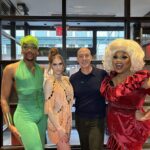Addiction is a universal struggle that transcends boundaries, affecting people from all walks of life. However, members of the LGBTQ+ community often face unique challenges when it comes to seeking and receiving addiction treatment. In this blog, we will discuss five prominent barriers that can hinder access to effective addiction treatment within the LGBTQ+ community. Understanding these barriers is crucial for developing more inclusive and supportive treatment approaches that address the diverse needs of this community.
Stigma and Discrimination
Stigma is a formidable barrier that casts a shadow over many aspects of LGBTQ+ individuals’ lives, including their willingness to seek help for addiction and go to drug or alcohol rehab. The societal stigma associated with both being LGBTQ+ and dealing with addiction can lead to a sense of shame, making it difficult for individuals to admit they have a problem and ask for help. Discrimination can exacerbate this problem, with fear of being judged or treated poorly by healthcare providers dissuading LGBTQ+ individuals from seeking treatment. This barrier underscores the importance of creating safe and non-judgmental spaces where individuals can openly discuss their addiction issues without fear of discrimination.
Lack of Culturally Competent Care
Cultural competence refers to the ability of healthcare providers to understand and address the specific needs of diverse populations. For the LGBTQ+ community, receiving addiction treatment from professionals who lack awareness and sensitivity to their unique experiences can be discouraging and even harmful. Effective treatment requires understanding the nuances of LGBTQ+ identities, such as the intersection of gender identity, sexual orientation, and mental health. Without this understanding, misdiagnoses and inappropriate treatments can occur, leading to ineffective outcomes and potential harm. Bridging this gap requires ongoing training for healthcare providers to ensure that they can offer LGBTQ+-affirmative care.
Mental Health Challenges
Members of the LGBTQ+ community often experience higher rates of mental health challenges compared to the general population. These challenges can stem from societal pressures, discrimination, and the struggle to find acceptance. Unfortunately, mental health issues and addiction often go hand in hand, forming a dual diagnosis that requires specialized treatment. However, many addiction treatment programs fail to adequately address mental health needs, leaving LGBTQ+ individuals underserved. Offering integrated treatment that addresses both addiction and mental health is crucial for breaking down this barrier and improving outcomes for this community.
Lack of Visibility and Representation
Representation matters, both in society at large and within the healthcare system. LGBTQ+ individuals need to see themselves reflected in the healthcare professionals and support systems they interact with. Without visible LGBTQ+ role models and advocates in addiction treatment settings, individuals may feel isolated and less inclined to seek help. Furthermore, a lack of representation can lead to a disconnect between healthcare providers and their LGBTQ+ clients, inhibiting effective communication and understanding of individual needs. Efforts to increase LGBTQ+ representation in addiction treatment can make a significant difference in breaking down this barrier.
Economic and Structural Barriers
Access to addiction treatment is often determined by socioeconomic factors. LGBTQ+ individuals may face economic and structural barriers that limit their ability to access quality care. This can include a lack of insurance coverage for LGBTQ+-specific treatments, limited financial resources, and geographic isolation from LGBTQ+-friendly treatment centers. These barriers can be particularly daunting for transgender and non-binary individuals, who may require gender-affirming treatments as part of their recovery journey. Addressing economic and structural barriers requires policy changes that prioritize equitable access to addiction treatment for all members of the LGBTQ+ community.
Fear of Relapse and Social Exclusion
For many LGBTQ+ individuals in recovery, the fear of relapse and subsequent social exclusion can be a significant barrier to seeking addiction treatment. The LGBTQ+ community often forms tight-knit bonds and support networks that provide a sense of belonging and acceptance. However, disclosing one’s addiction and pursuit of treatment can lead to fears of being ostracized or rejected by these networks. This fear can be especially potent when individuals have experienced rejection in the past due to their sexual orientation or gender identity. Overcoming this barrier requires creating a treatment environment that not only supports recovery but also acknowledges and respects the importance of community bonds. By offering group therapy and peer support that is specifically tailored to LGBTQ+ individuals, treatment centers can help individuals navigate their recovery journey without feeling isolated from their support networks.
Last modified: August 24, 2023














